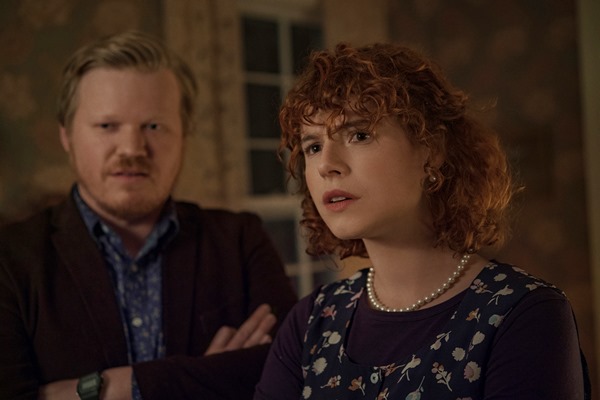
It’s not long into I’m Thinking of Ending Things when viewers realize that things are not quite as they seem. It begins as a young woman, Lucy (Jessie Buckley), and her boyfriend, Jake (Jesse Plemons), drive through a snowy, country road so she can meet Jake’s family for the first time, though the couple have only been dating for six weeks. In an interior monologue, she expresses mixed feelings about this relationship and where it’s headed, and the conversation between the two of them is friendly but strained. Along the way, a few incongruous details standout in the landscape, such as a beautiful, brand-new swing-set standing in front of an abandoned house. Also, for no reason we are immediately aware of, this sequence is intercut with one involving the janitor of a high school (Guy Boyd), yet we trust that this mystery will be explained in time.
One cannot say that is precisely what happens, and viewers who fall in love with this puzzle are likely those who treasure plot twists and don’t want them spoiled. But this is a hard movie to spoil, because, even by the end, we are not 100 percent sure what has occurred. Suffice to say that, once these two enter Jake’s parents’ house, peculiar details begin to multiply. Jake insists on giving Lucy a tour of his family’s snowy, decrepit farm property, and tries to ignore the bodies of a few dead lambs. Once the couple are indoors, they wait for an awkward amount of time for his parents to appear, and Lucy notices a basement door bound with tape and a few photos on the wall, which ostensibly feature Jake, but they remind her of herself. Then his parents (Toni Collette and David Thewlis) come downstairs, and reality begins to warp at an alarming rate.
This is, after all, a film from Charlie Kaufman, and it finds him with familiar themes and techniques. As Being John Malkovich featured a physical portal through which one can enter another person’s mind, and as Eternal Sunshine of the Spotless Mind envisioned one man’s memories as a series of scenes he revisits, so once again the mind itself is the setting. In adapting Iain Reid’s popular novel of the same name, Kaufman finds yet another vehicle for exploring identity, longing, denial, and missed opportunities while creating a movie that is a maze-like series of corridors. This is what we’ve come to expect from Kaufman, and there are many striking images, fine performances, and deliberate, exacting decisions made to execute it.
This film does not, however, succeed like Kaufman’s earlier efforts. Instead, it succumbs to ponderousness. The dialogue is laden with obvious references to works of art (“Have you read Ice by Anna Kavan? It’s about…”) that link too clearly to the film’s themes, and otherwise occupies such heady territory with such bluntness that it is difficult to take seriously. As the film becomes more phantasmagoric, it moves into the territory of heavy-handed symbolism of the sort that might entrance some viewers, but left this one cold.
Unlike Being John Malkovich, Adaptation, and Eternal Sunshine, it lacks the sense of humor that animates Kaufman’s work in his fruitful collaborations. In those films, an enormous sense of play illuminates their serious ideas. True, there is a kind of humor when we encounter Jake’s parents. Their behavior is bizarre, the performances are expert, and the atmosphere is queasy. Nevertheless, the overall effect of the movie is one of portentousness, and of a director trying too hard to blow the audience’s minds. His earlier works were strong because their premises were playful and didn’t take themselves so seriously. Maybe one day, Kaufman will get his original, infectious spirit back.
















Leave A Comment